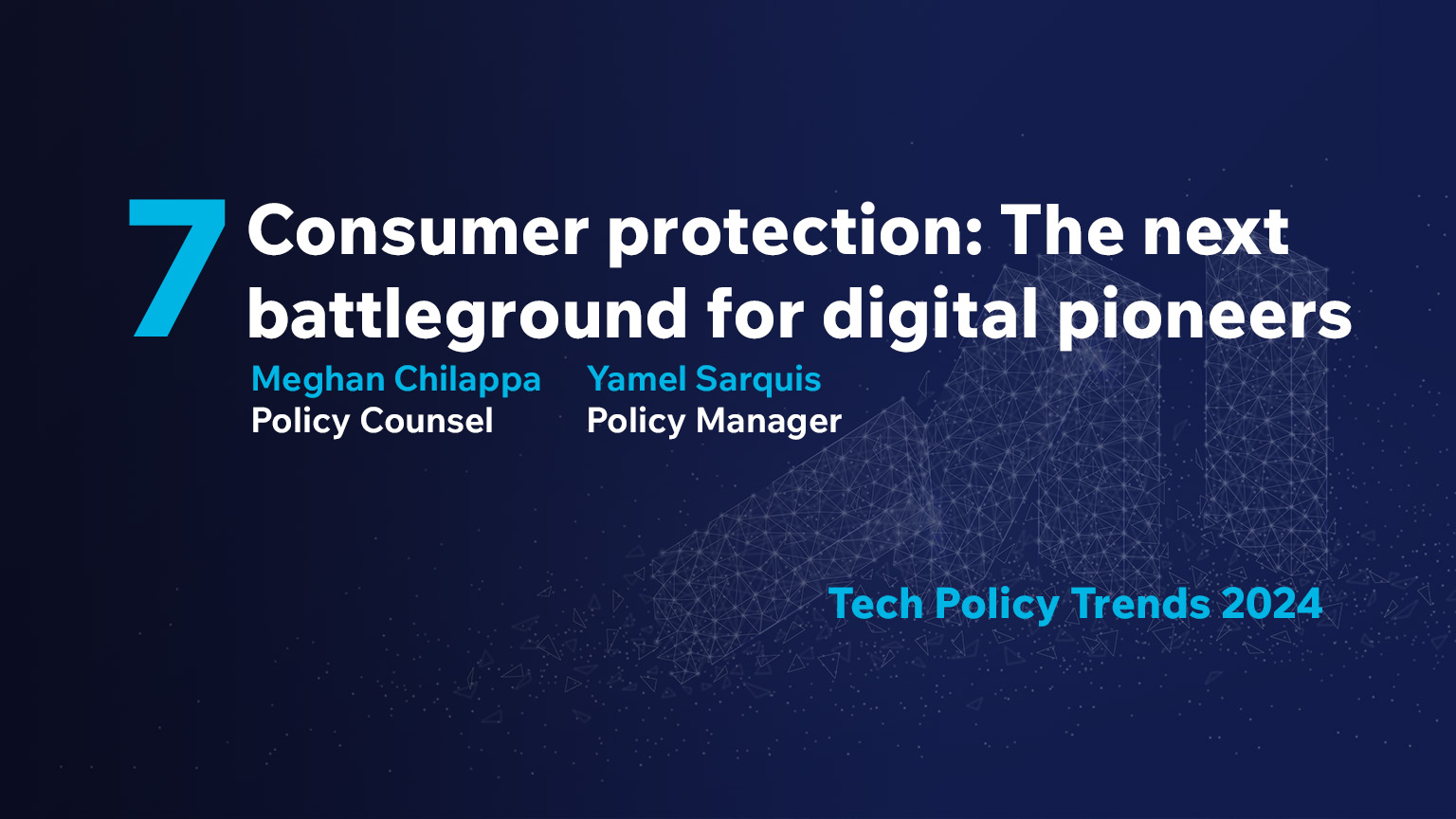

Meghan Chilappa
Artificial Intelligence


With technologies emerging and advancing at a rapid pace, tech players are under unprecedented scrutiny for how it impacts consumers’ daily lives. The digital policy arena will be a key battleground in 2024. Can authorities join forces to expand their footprint?
The growth of the digital economy presents unique consumer protection issues and opportunities. Lawmakers around the world have discussed and debated policy solutions to “rein in Big Tech”, but technological developments are outpacing the legislative process.
In 2024, policymakers will continue to debate, propose, and, in some jurisdictions, enact legislation aiming to protect digital consumers. They will attempt to address the growing number of issues captured under consumer protection while continuing to aggressively target the biggest companies. These issues include, but are not limited to, data privacy, digital payments, marketing and advertising, and fraud.
While many questions remain, a few trends are clear. Policymakers will continue to wrestle with consumer protection in the digital arena, discussing whether to amend older laws or enact new ones. They have also begun debating new and emerging technologies, like AI, and their impacts on consumer protection and competition.
Around the world, the actions of policymakers show us that tech regulation will be a key focus area over the next few years. In the US, both political parties want to regulate online platforms. The bipartisan Digital Consumer Protection Commission Act would create a new commission to combat and target Big Tech’s practices, including privacy and competition. The Consumer Financial Protection Bureau (CFPB) has also proposed regulating tech giants’ digital payments and smartphone wallet services, saying they rival traditional payment methods in scale and scope but lack consumer safeguards.
The EU’s Digital Markets Act (DMA) came into force this year, targeting Big Tech “gatekeepers” with various interoperability, fairness, and privacy demands. In line with this trend, the UK’s Digital Markets, Competition and Consumers Bill (DMCC) will likely be enacted in 2024. The Bill focuses on consumer protection, digital markets, and competition, aiming to crack down on rip-offs, protect consumer cash online, boost competition in digital markets, and provide stronger enforcement powers for the Competition and Markets Authority (CMA).
These policy actions illustrate that regulators are reacting aggressively to large technology companies and that many policy battles against Big Tech show no signs of slowing.
When it comes to going after the tech giants, consumer protection authorities collaborate closely – both within country-level government agencies and across borders. We predict that different regulators within and across countries will continue coordinating to go after similar companies for what they perceive as a lack of consumer safeguards. In some instances, government agencies have shown a willingness to work with industry on certain issues, like loot boxes[1] for the video game industry, to develop harmonised standards. These closer partnerships are inevitable given the cross-cutting nature of consumer protection issues (touching on data protection, privacy, competition, etc.).
In the US, the Federal Trade Commission (FTC) is pursuing several partnerships to expand its consumer protection footprint both domestically and abroad. The FTC recently signed a cooperation agreement with the consumer protection authorities of four Latin American countries to combat fraud within and outside the US. In addition, the FTC is also partnering with the DOJ’s Consumer Protection Branch more frequently. At the state level, meanwhile, Attorneys General are working on consumer protection enforcement actions in conjunction with the FTC. This trend is only set to accelerate.
The EU’s Consumer Protection Cooperation (CPC) Network also pursues EU-wide cases. Through the CPC, Ireland’s Competition and Consumer Protection Commission (CCPC) acted as co-lead with the Swedish Consumer Agency in two coordinated actions on WhatsApp and TikTok.
Amid growing concern from consumers and policymakers, partnerships (country- or region-specific) may form, for example, between data protection and competition authorities. In the past, data protection authorities in the Asia-Pacific and Latin American regions have also established closer relationships with consumer protection authorities.
However, a complicated landscape at the country level, with multiple sector regulators utilising distinct laws to achieve different policy goals, will create confusion and create regulatory challenges for all technology businesses. For some consumer protection matters, particularly evolving issues related to AI or “dark patterns”,[2] it remains unclear for industry whether specific agencies will target certain issues or if these will fall under the purview of data protection authorities.
Emerging markets are likely to continue borrowing from digital policy pioneers. Such was the case with the General Data Protection Regulation (GDPR), which triggered a global “copy-and-paste” effect, with developing countries adopting its principles wholesale. Fast-forward to 2024 and we see the same pattern unfolding in consumer protection.
Brazil’s proposed Digital Market Act, inspired by the EU’s DMA, aims to level the playing field for new entrants. In 2023, legislators held public hearings (alongside EU representatives) and hosted prolonged debates in Congress to promote discussions that enable consumer protection by making it easier for new platforms to enter the market. However, critics have raised caution that broad, open-ended principles with no local tailoring have generated lack of clarity and guidance in the text’s application and created uncertainty for all stakeholders. This highlights the perils of a one-size-fits-all approach in sensitive areas like consumer protection and fair competition.
In the same vein, India’s Consumer Protection Act (2019) and Competition Act (2002) have also been subject to amendment discussions. While safeguarding consumer rights and promoting fair competition are crucial, imitating preemptive European restrictions could stifle India’s burgeoning startup ecosystem and innovative sectors. Flexibility and dynamism are key to attracting investment in infrastructure and fostering innovation. A domino effect triggered by European regulations may not lead to the desired outcomes of innovation and economic growth.
While the influence of European-inspired digital market regulation is likely to persist in 2024, stakeholders in emerging economies must be cautious. Blindly copying regulations designed for different contexts and maturity levels could jeopardise domestic innovation, impeding economic growth and inadvertently harming consumer protection.

